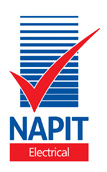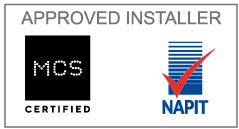The Schemes Explained

The following section describes the schemes that are available to installers through NAPIT. Although the following schemes have individual purposes, the installers you may be using may well belong to several. For example, installers involved in the Microgeneration Certification Scheme or Energy Efficiency Measures Scheme below and who work in England and Wales will almost certainly also be certificated under the Competent Person Scheme as well.
Certification is achieved and maintained by office audits and site inspections carried out by NAPIT on an ongoing basis (at least annually). Where NAPIT's findings identify improvements these must be demonstrated in order for certification to continue.
Scheme Members are entitled to use the appropriate scheme logos shown in the following sections and which you may see on their literature and vehicles etc.
The schemes described below are those that involve consumers; however NAPIT schemes do also cover work in non-domestic situations.
This Government authorised scheme is for installers who carry out work covered by the Building Regulations in England and Wales. Members of the scheme must demonstrate their competence, must have at least £2 million public liability insurance, and be responsible for the compliance of their work against the Building Regulations for a period of 6 years from completion.
If you have any work done that is described in this section then its compliance with the Building Regulations must be certificated by law. If you use a NAPIT CPS Scheme Member they are entitled to self-certify the compliance of their work and you will get a Building Regulations Compliance Certificate from NAPIT. We will also notify your local authority that the work has been completed and certificated as compliant.
If you use an installer who is not certificated for regulated work, it must be notified in advance to Building Control (which can be local authorities, authorised Approved Inspectors or approved Third Party Certifiers) and subject to inspection and fees and they will issue a Completion Certificate.
Registered Competent Person - Electrical
Electrical work within CPS is uniquely identified under the common branding and messaging of the Registered Competent Person – Electrical (RCPE) collaboration between all of the scheme operators.
NAPIT full-scope electrical installers are eligible to display the Registered Competent Person Electrical Certification Mark in conjunction with the NAPIT logo, as shown above. The Mark identifies those firms recognised by government and industry as demonstrating the necessary competence to carry out electrical installation work in dwellings in England and Wales, complying with the IET Wiring Regulations (BS 7671) and the Building Regulations (including Part P).
Registered Installers are encouraged to promote this Certification Mark to customers to improve consumer recognition, verify their competence and raise awareness of the importance of using a Competent Person.
Consumers searching for electrical installers on this website, or contacting installers who display the Certification Mark, can be assured that they are registered and certificated as competent, as well as providing access to Building Regulations Compliance Certification and appropriate financial protection.
The types of electrical work covered by the scheme include:
- Full electrical installations
- One or more new circuits
- Full or partial rewires
- Replacement consumer units
- Circuit alteration or addition in a special location
Other Competent Person Scheme Activities
Away from electrical work the following areas of work can be covered by Competent Person Scheme members:
- Oil Heating (including storage tanks, pipework, boilers and other appliances)
- Solid Fuel Heating (including non-masonry chimney systems but excluding biomass, see below)
- Heating and hot water systems (including electric boilers for central heating, underfloor electrical heating, vented and unvented hot water storage, heat recovery systems)
- Plumbing (sinks, baths, showers, water supply, rainwater harvesting)
- Insulation (cavity wall, internal or external solid wall systems)
- Roofing (replacement covering of flat or pitched roofing)
- Replacement doors, windows and roof-lights
- Renewable energy small scale electricity generation (photovoltaics, wind turbines, water turbines, micro-CHP)
- Renewable energy small scale heat generation (biomass, heat pumps, solar thermal, micro-CHP)
- Ventilation systems and air-conditioning

This is a UKAS accredited industry scheme that covers all of the electrical work included above in CPS but is not limited to England and Wales. Certification against this scheme is recognised in Scotland, Northern Ireland, Jersey and the Isle of Man.
Electrical Inspector Scheme (UK) - EIS
In addition to having electrical installation work done, the other area where consumers often get involved with electricians is when they need their existing installations checked out. Members of the Electrical Inspector Scheme are competent to carry out electrical inspection and to produce Electrical Installation Condition Reports (EICRs). The scheme focuses on the qualifications and competence of individual inspectors working for the certificated businesses. Those individuals are required to have specific qualifications or certificates of competence in the inspection, testing and certification of electrical installations. Scheme members must also hold at least £250,000 professional indemnity insurance in addition to the £2 million public liability insurance required of installers. Quality assurance is achieved by the auditing of EICRs by NAPIT on an ongoing basis.

This scheme was originally delivered under license to the government and is currently transferring to industry under the MCS Charitable Foundation. Compliance with MCS is required where installations are intended to be eligible for financial incentives such as Feed in Tariffs and the Renewable Heat Incentive. It is also specified for other contracts and is recognised by many as the mark of quality for small scale renewable energy installations in general.
The range of products that can be installed under this scheme includes:
- Photovoltaic systems
- Wind turbines
- Micro-CHP
- Solar thermal systems
- Heat Pump Systems
- Biomass Systems
Energy Efficiency Measures Scheme (UK) – EEM
This scheme was initially developed as the Green Deal and for installers it involved compliance with a British Standard PAS 2030. Although Green Deal has ended installations completed during its operation continue to be subject to its requirements, and PAS 2030 continues to be required for a range of energy efficiency improvement work including work under the Energy Companies Obligation (ECO).
The range of products covered by PAS 2030 includes:
- Building Fabric measures such as insulation, energy efficient glazing and doors, solar blinds and shading devices
- Mechanical Building Services such as replacement boilers, wet under floor heating, warm air heating, heat recovery, hot water systems and controls, air conditioning and controls
- Electrical Building Services including storage heaters, light fittings, lighting systems and controls
TrustMark is a Government approved consumer protection organisation. NAPIT Scheme Members are eligible to join TrustMark via NAPIT and undergo additional checks and audits, as well as committing to a Code of Practice that commits them to a higher degree of consumer care and accountability to TrustMark as well as to NAPIT.
If you search for a NAPIT scheme member, the report generated will indicate whether they are also a member of TrustMark, meaning they are covered by the TrustMark Code of Practice in addition to the technical certification.
Please note that in the renewable energy sector there are also other consumer protection schemes that you will see, particularly RECC and HIES. Whereas TrustMark is integrated with NAPIT, these other Consumer Code schemes exist separately and alongside NAPIT certification. So if you have consumer care issues, and your installer is a member of one of those Consumer Codes you should raise any issues directly with the Code operator. If your installer is a member of an alternative Consumer Code, the details should be included in quotation documents.